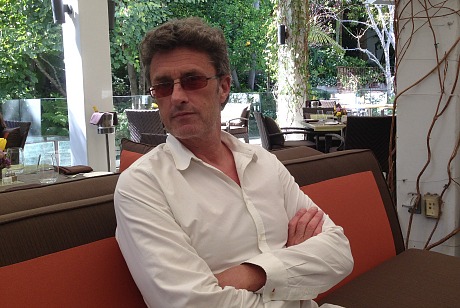I drove over to the serene Sunset Marquis yesterday afternoon for a quick chat with Pawel Pawlikowski, the Polish-born director of Ida (Music Box Films, 5.2), the austere, undeniably brilliant black-and-white drama that I saw and raved about at last January’s Sundance Film Festival. I only had 20 minutes with the guy so all we did was bat the ball around. Here’s the mp3 of our discussion. Pawlikowski has a cultivated, easy-going aura, like that of a laid-back jazz musician or art curator or novelist. He’s one of those European cool-cat types with a discreet eye for the ladies — you can see that in Ida and his earlier films, most notably Last Resort (’00), My Summer of Love (’04) and Woman in the Fifth (’11). And so we naturally discussed Ida’s quietly alluring lead actress, Agata Trzebuchowska, who is presently in school and is not, even after Ida, with any particular interest in an acting career. Until recently, that is, when a big-name director (whom Pawlikowski declined to name) asked her to audition for something. So maybe.

Ida director & co-writer Pawel Pawlikowski at rear outdoor restaurant attached to Sunset Marquis hotel — Wednesday, 4.23, 2:45 pm.
We briefly discussed famed Polish director Jerzy Skolimowski and particularly Moonlighting (’82). Critic Harlan Jacobson once remarked that there are two kinds of people in the world — those who hear Moonlighting and think of the mid-to-late ’80s Bruce Willis and Cybil Shepard TV series and those who think of Skolimowski’s film. I would guess that even your typical HE reader thinks more readily of Willis-Shepherd but perhaps not.
Pawlikowski mentioned that after many years in London and Paris he’s moved back to Warsaw and is living very close to where he grew up. I mentioned that a dp friend, Svetlana Cvetko (Red Army, Inside Job) has agreed to serve as a juror at the 2014 Cameraimage Cinematography Festival (11.15 to 11.22) in the unspellable, certainly unpronouncable Polish city of Bydgoszcz. Pawlikowski said this festival is highly respected but they he may not attend this year…who knows?
Here’s my most recent piece about Ida, posted on 4.4.14:
“This is one superbly composed, austere, Robert Bresson– or Carl Dreyer-like art film — set in 1962 and shot in black-and-white with a 1.37 aspect ratio. It’s about nuns, vows, cigarettes, fate, family skeletons, sex and sexy saxophones, Nazis and Jews and the grim atmosphere of Communist Poland. And it’s anchored by two understated knockout performances — one by the quietly mesmerizing, ginger-haired Agata Trzebuchowska as a young almost-nun named Anna, the other by Agata Kulesza as Anna’s aunt — the morose, blunt-spoken, hard-drinking, somewhat promiscuous Wanda.
“Not a whole lot happens but enough does. Everything is choice, precise, careful, plain. It’s a highly disciplined film that is restrained but complete in a less-is-more fashion.
“The story is basically about Anna being told to visit Wanda before taking her vows, and then quickly learning from Wanda that she’s actually Jewish and that her name is Ida Lebenstern, and that Wanda will be taking Ida to a rural area to fidn about her deceased parents, and particuarly to find the farmer who hid them from the Nazis during the end of the war and about the circumstances behind their deaths and where they’re buried and so on.
“All through the journey Anna/Ida, who has been nowhere and done nothing except huddle in a nunnery her whole life, says little but absorbs everything. The film is basically about Ida’s eyes and curiosity as she contemplates ‘life’ for the first time.
“Ida and Wanda have their differences but no arguments. Ida meets a good-looking saxophone player (Dawid Ogrodnik) who has the instant hots for her despite Ida being dressed in garments of denial. The elderly farmer’s son tries to shield his father from the two women but eventually the truth comes out. The discovery of her parents grave sinks in, as it would with any child of murdered parents, and is presumably influencing her thinking about whether to live her life as Catholic nun or as the Jew that she was and is.
“The question, of course, is whether or not Ida will decide that life outside the nunnery hold something for her and that perhaps the sax player is a good bet, or whether she’ll withdraw and return and take her vows.
“I have to say that while I found a certain event that happens toward the end of the film shocking and quite powerful, the depiction of Ida’s final choice is a bit underwhelming. It is what it is and I respect that Pawlikowski and co-screenwriter Rebecca Lenkiewicz chose what they chose, but it didn’t meet my idea of satisfying storytelling.
“That aside, Ida is about as good as it gets on this austere FilmPolski level. It’s like watching a film that was made in 1962 or thereabouts. You almost expect to see the young Roman Polanski or Jerzy Skolimowski turning up in a supporting role. Ida owes nothing to today’s sensibility in any way, shape or form. It’s a classic-style revisiting of mid-20th Century Eastern European cinema, and of a very high order. I loved it. I could see it again right now.”
